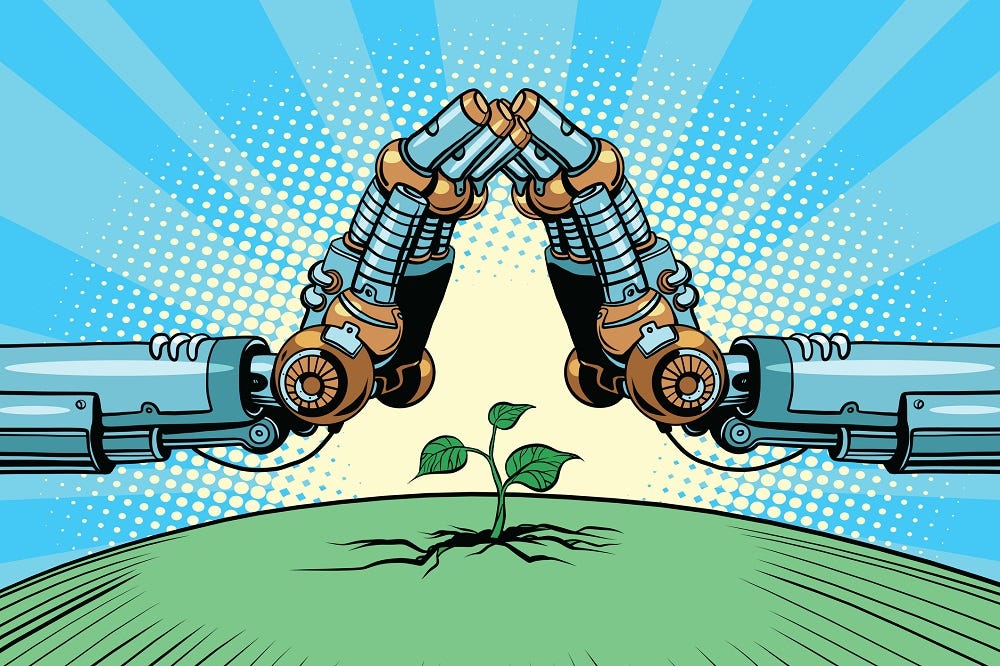The Role of AI in Tackling Climate Change
Artificial intelligence (AI) has emerged as a transformative force in the global effort to combat climate change. From optimizing energy systems to enhancing climate modeling, AI's applications span numerous sectors, each contributing to the mitigation and adaptation strategies needed to address the climate crisis. 
Below, we explore how AI is reshaping environmental stewardship and its challenges.
AI in Climate Monitoring and Data Analysis
One of AI's most impactful roles is in climate monitoring. The increasing availability of satellite imagery and environmental data has created a need for sophisticated tools capable of processing vast datasets. AI systems excel at analyzing these data streams to identify patterns and trends that humans might miss.
For instance, machine learning algorithms analyze satellite data to monitor deforestation, track changes in polar ice, and detect illegal fishing activities. These insights enable policymakers and conservationists to act swiftly in preserving ecosystems and biodiversity. Additionally, AI-powered sensors in urban areas measure air quality and predict pollution hotspots, aiding in the design of cleaner cities.
Optimizing Renewable Energy Systems
Renewable energy plays a critical role in reducing carbon emissions, and AI has become indispensable in optimizing its integration into the grid. By using predictive analytics, AI systems forecast energy production from sources like solar and wind, which are inherently variable. For example, Open Climate Fix uses AI to predict cloud cover and optimize solar energy generation.
AI also enhances grid efficiency. Intelligent algorithms manage energy storage systems, ensuring that excess power generated during peak periods is stored and redistributed when needed. These technologies not only improve efficiency but also lower operational costs, making renewable energy more accessible and reliable.
Enhancing Climate Modeling and Risk Assessment
Climate models are essential for understanding future scenarios, but their complexity often limits their accuracy and applicability. AI addresses this challenge by improving the precision of climate predictions. Advanced machine learning models process historical and real-time data to refine forecasts of extreme weather events, such as hurricanes and heatwaves.
In risk assessment, AI helps identify regions most vulnerable to climate impacts, enabling targeted adaptation strategies. For instance, digital twins—virtual replicas of physical environments—simulate how changes like sea-level rise will affect urban infrastructure, guiding investments in resilience.
Driving Innovation in Sustainable Practices
AI fosters innovation in designing sustainable technologies and practices. In agriculture, precision farming systems use AI to optimize water usage, monitor crop health, and reduce fertilizer waste, promoting eco-friendly farming. Similarly, AI accelerates the development of clean technologies, such as advanced battery systems, by simulating experiments and identifying optimal materials.
Moreover, AI supports efforts to decarbonize industries. For example, it enhances predictive maintenance in manufacturing, reducing energy consumption and minimizing waste. By embedding sustainability into operational processes, AI helps industries transition towards net-zero goals.
Challenges and Ethical Considerations
Despite its potential, the deployment of AI in climate solutions is not without challenges. One pressing concern is the carbon footprint of AI itself, particularly from energy-intensive data centers. The growing demand for computational power underscores the need for energy-efficient AI models.
Ethical considerations also arise regarding the equitable distribution of AI technologies. Developing countries, often the most affected by climate change, may lack access to AI-driven solutions, exacerbating global inequalities. Addressing these issues requires collaborative efforts to democratize AI and promote sustainable practices in its development.
Conclusion
AI's role in combating climate change is multifaceted, offering tools for mitigation, adaptation, and innovation. By harnessing its capabilities responsibly, society can accelerate progress toward a sustainable future. However, achieving this potential demands a concerted effort to overcome the technical and ethical challenges that accompany AI’s use. As AI continues to evolve, its integration into climate strategies must prioritize inclusivity, efficiency, and environmental stewardship.
References
- World Economic Forum: "9 ways AI is being deployed to fight climate change"
- Alan Turing Institute: "Tackling climate change with data science and AI"
- MIT Sloan: "Tackling climate change with machine learning"
- Climate Change AI: Applications of AI in Climate Solutions
- Nature: AI-powered sensors in climate monitoring
- Open Climate Fix: AI in renewable energy optimization
- Stanford University: AI in sustainable battery design
- UN Climate Change: Ethical considerations in AI and sustainability
- Energy.gov: Role of AI in smart grids
- IPCC Reports: Advances in climate modeling with AI
































































